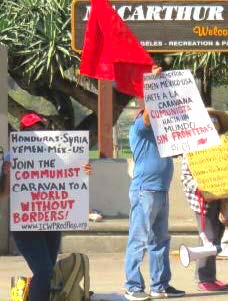
MEXICO CITY—On January 17, a new caravan of migrants left for the United States from Honduras. Days later, another contingent, this time from El Salvador, was one its way to the same destination. Both ran into the wall created by Trump in southern Mexico and in the northern triangle of Central America (Guatemala, El Salvador and Honduras).
The caravan was the migratory phenomenon that shook North and Central America in 2019. Thousands of Central Americans, who were later joined by Caribbean and Africans, entered massively through southern Mexico.
The caravans were a new way of migrating that revealed the devastating conditions of the life that migrants sought to leave behind, but also created a new community as protection against the dangers of the road to the United States.
In the last year, much has changed. Trump’s threats to impose more tariffs on certain Mexican merchandise forced the López Obrador government to change its immigration policy. People who participated in the first caravan received transit, work, and shelter visas. Following Trump’s threats, Obrador eliminated all this and returned to the policies of the previous governments: repression, criminalization and deportation of Central American migrants.
The newly created National Guard, created by the administration of Obrador, was formed to dismantle the caravan and deport the migrants.
Trump, Mexico and the northern triangle
Thousands of migrants marching to the United States created a crisis for the Trump administration. Bowing to US pressure, the governments of Guatemala, Honduras and El Salvador have agreed to be “safe countries.” The governments of these countries have to ensure the dismantling of the caravans and be places of refuge for asylum applications for the people of these countries. If someone from these three countries applies for asylum to the United States, they can only migrate to one of the other two countries of the northern triangle.
These agreements are an insult to the masses that live in the northern triangle. These three countries are in a very similar political, social and economic situation. Migrants will face the same economic conditions as well as the same violence in any one of these countries.
Meanwhile, Mexico intends to promote joint economic projects in Central America. At the same time, Obrador has announced that there are now 4,000 jobs available in southern Mexico for Central American migrants. This is no relationship of solidarity! This represents the interests of Mexican capital, which maintains imperialist practices in Central America.
Reorganization of the workforce
Humans have never stopped migrating over the whole earth. How this happens is historically determined. Today, in Central America, migration is a process of reorganization of the workforce. Migration is an escape valve for unemployment and job insecurity in the northern triangle, caused by low technological development and poverty caused by imperialism—both US and Mexican imperialism.
The US embassy in San Salvador has announced a plan for 6,000 work visas, but has only granted 500 work visas for farmworkers. Mexico offers 4,000 jobs and immigration regularization. Workers’ lives only have meaning as long as their labor power is a commodity. Work visas and cooperation projects manage the resources that capital needs for its survival.
Communist solidarity
As soon as we learned about the first caravan, members and friends of the International Communist Workers’ Party went to a refugee shelter in Mexico City and launched a solidarity campaign within a UNAM community college.
To solve these problems the working class needs a resounding change in the social forms of production, a cultural revolution and a way of doing politics that involves the masses in making fundamental decisions for society
To achieve this, we must build ICWP. Solidarity can help us create and build communist social relations. We must fight against nationalism with all our friends, organize actions of solidarity with Central American migrants, invite more people to our meetings and present our ideas through Red Flag.
The experience of the masses in Central America, full of pain and boldness, can inspire us in the fight against colonialism, imperialism and capitalist social relations of production. From these experiences, we can imagine a new way of life, where we migrate willingly in order to contribute to building a better world.

